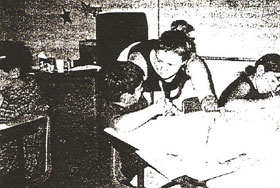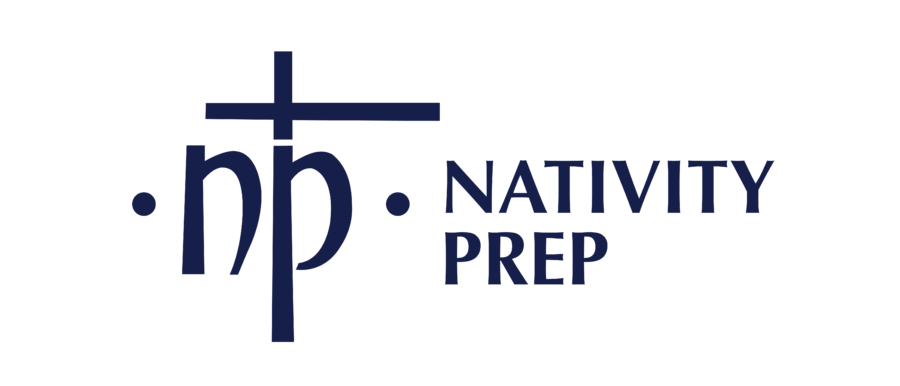Catholic Volunteers Bring Education Experiment to San Diego’s Inner City
The Southern Cross (October 25, 2001)
By Joyce Carr

San Diego—Twenty fifth graders at the new Nativity Prep Academy off Market Street gathered on September 17 around a table – adorned with a fountain, cross and American flag – to pray for their safety in the wake of terrorist attacks.
On September 18, Jesuit Father Eduardo Samaniego, pastor of Christ the King Church, blessed the school, pupils and teachers, asking them to pray for victims of the September 11 attacks on their country and for American Muslims threatened by hate crimes. The priest also urged the class to pray for those who have organized and funded the academy.
That process involved two years of homework by local educators and community leaders, who learned that poor children are 56 times more likely to be educationally neglected than their middle and upper-class counterparts, and that education is the key to correcting this inequality, according founding director David Rivera.
The solution? Form an independent Catholic organization and offer a tuition-free education designed to lift pupils out of poverty with a 12-hour school day, free meals, tutoring, health services, field trips, camping and parent education.
Preparations for the academy’s September 7th opening included forming a steering committee and governing board, and enlisting local partners and advising agencies.
The tuition-free school at 3275 Market Street is funded by grants and by private and corporate donations. Ten teachers are volunteering two years of service at the site in exchange for a no-cost master’s degree and credential in education from USD.
Public school students were recruited through home visits, parent meetings and announcement sat Christ the King Church and St. Jude Shrine.
During the first week of school, the pupils took diagnostic tests to determine their grade and skill levels in subjects, as well as their learning styles.
The class of Hispanics and African-Americans unanimously told The Southern Cross they enjoy their one-room school. “It’s cool because the teachers help you,” says Sylvia Esquivel, adding that she likes to dissect frogs in science classes, her favorite subject.
Robert Porcher says he likes using computers and playing a geography game on a floor map of the United States.
His mother, Robin Porcher of studies, sports and recess and Christ the King Parish, expects Robert “to thrive… in the small class with individual attention and tutoring.”
Rosa Herrera, single mother in St. Jude Parish, enrolled he son Adrian as an escape from the gang activity in her neighborhood.
Math instructor Tracy Pavey, a Notre Dame graduate in business administration, exchanged a future in the corporate world for volunteer work. “I thought I would try teaching poor children who need more love, understanding, and attention,” she says. “They will teach me more than I will teach them. Like appreciating the simple things in life—the three meals a day we take for granted.”
Working with poor Hispanic children motivated language arts instructor Margaret Liegel to volunteer. The Boston College graduate, who has lived in Mexico and studied in Ecuador, will also teach English as a Second Language to the parents.
“It’s exciting to see the interaction between the teachers and pupils,” Rivera says. “You can see them building long-term relationships.”
The academy’s 12-hour day includes daily classes in religion, ethics, and values. The lengthy school day also includes social studies, sports and recess and concludes with dinner and 990 minutes of tutoring by USD students who receive college credit for their services.
Pupils will receive three daily meals through the federal Free Lunch Program.
The academy is one of 40 schools nationwide modeled after the first Jesuit Nativity Mission School in New York City’s lower East Side, founded in 1971. Today nearly 90 percent of that school’s graduates enroll in college—a goal the local academy hopes to reach.
Nativity Prep will eventually enroll pupils in grades 5-8, adding an additional grade each year.
Although the institution promises a quality education, Rivera notes an ongoing need for funds to cover this year’s $7,000 per pupil cost (including building expenses) and to purchase another house for 10 more teachers next fall. Also needed are 12 new computers and free or discounted labor or contractors and electricians.
Meeting these needs will help founding advisor Brian Bennett’s hopes become a reality—that the school “will proved that parents and low-income communities can benefit from choices in education.”


